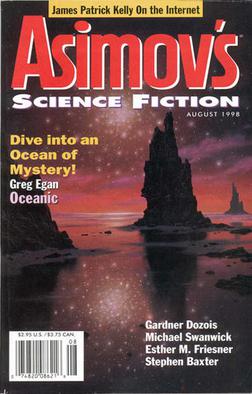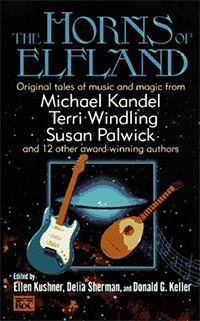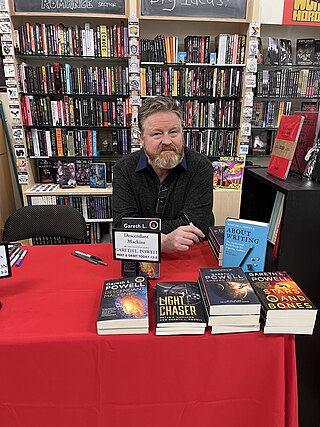Greg Egan is an Australian science fiction writer and mathematician, best known for his works of hard science fiction. Egan has won multiple awards including the John W. Campbell Memorial Award, the Hugo Award, and the Locus Award.

Permutation City is a 1994 science-fiction novel by Greg Egan that explores many concepts, including quantum ontology, through various philosophical aspects of artificial life and simulated reality. Sections of the story were adapted from Egan's 1992 short story "Dust", which dealt with many of the same philosophical themes. Permutation City won the John W. Campbell Award for the best science-fiction novel of the year in 1995 and was nominated for the Philip K. Dick Award the same year. The novel was also cited in a 2003 Scientific American article on multiverses by Max Tegmark.

Interzone is a British fantasy and science fiction magazine. Published since 1982, Interzone is the eighth-longest-running English language science fiction magazine in history, and the longest-running British science fiction (SF) magazine. Stories published in Interzone have been finalists for the Hugo Awards and have won a Nebula Award and numerous British Science Fiction Awards.

Incandescence is a 2008 science fiction novel by Australian author Greg Egan. The book is based on the idea that the theory of general relativity could be discovered by a pre-industrial civilisation.

"Oceanic" is a science fiction novella by Australian writer Greg Egan, published in 1998. It won the 1999 Hugo Award for Best Novella.

The Horns of Elfland is a 1997 fantasy anthology edited by Ellen Kushner, Delia Sherman and Donald G. Keller.

Zendegi is a science fiction novel by Australian author Greg Egan, first published in the United Kingdom by Gollancz in June 2010. It is set in Iran in the near future and deals with mapping the human brain, virtual reality and the democratization of Iran. The title of the book means "life" in Persian; the name of the virtual reality system featured in the story is Zendegi-ye Behtar, Persian for "better life".
Will McIntosh is a science fiction and young adult author, a Hugo-Award-winner, and a winner or finalist for many other awards. Along with ten novels, including Defenders,Love Minus Eighty, and Burning Midnight, he has published dozens of short stories in magazines such as Asimov's Science Fiction, Strange Horizons, Lightspeed Magazine, Clarkesworld, and Interzone. His stories are frequently reprinted in different "Year's Best" anthologies.

Gareth Lyn Powell is a British author of science fiction. His works include the Embers of War trilogy, the Continuance series, the Ack-Ack Macaque trilogy, Light Chaser, and About Writing, a guide for aspiring authors. He has also co-written stories with authors Peter F. Hamilton and Aliette de Bodard.
This is a list of the published works of Aliette de Bodard.
Gregory Patrick Feeley is an American teacher, critic, essayist and author of speculative fiction, active in the field since 1972. He writes as Gregory Feeley, with some of his early works appearing under the name Greg Feeley.
"Axiomatic" is a science-fiction short story by Australian writer Greg Egan, first published in Interzone 41 in November 1990. The short story was included in the collection The Best of Greg Egan in 2020.
"Singleton" is a science-fiction short story by Australian writer Greg Egan, first published in Interzone 176 in February 2002. The short story was included in the collections Crystal Nights and Other Stories and Oceanic in 2009, as well as The Best of Greg Egan in 2020. The short story is set in the same universe as Egan's short story "Oracle" and Egan's novel Schild's Ladder.
The Best of Greg Egan is a collection of science fiction stories by Australian writer Greg Egan, published by Subterranean Press in 2019.
Dark Integers and Other Stories is a collection of five science-fiction short stories by Australian writer Greg Egan, published in 2008 by Subterranean Press. One of them, "Oceanic", won the Hugo Award for Best Novella, while two others were nominated.
Crystal Nights and Other Stories is a collection of nine science-fiction short stories by Australian writer Greg Egan, published on 30 September 2009 by Subterranean Press. Two of the stories were nominated for the Hugo Award.
Oceanic is a collection of 12 science fiction short stories by Australian writer Greg Egan, published on 16 July 2009 by Gollancz.
"Luminous" is a science-fiction short story by Australian writer Greg Egan, first published in Asimov’s Science Fiction in September 1995. The short story was included in the collections Luminous in 1998, Dark Integers and Other Stories in 2008, and The Best of Greg Egan in 2020. It was nominated for the Hugo Award for Best Novelette in 1996. It has a sequel, the short story "Dark Integers".
"Dark Integers" is a science-fiction short story by Australian writer Greg Egan, first published in Asimov's Science Fiction in October/November 2007. The short story was included in the collections Dark Integers and Other Stories in 2008, Oceanic in 2009 and The Best of Greg Egan in 2020. It was nominated for the Hugo Award for Best Novelette in 2008. It is a sequel to the short story "Luminous".
"Reasons to Be Cheerful" is a science-fiction short story by Australian writer Greg Egan, first published in Interzone 118 in April of 1997. The short story was included in the collections Luminous in 1998 and The Best of Greg Egan in 2020.






